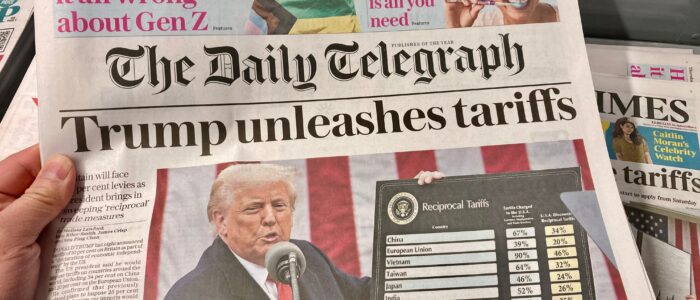Published
Trump’s Tariffs Threaten UK Identity
By: David Henig
Subjects: North-America

There was a small sigh of relief in the UK when President Trump finally reached the country in his tariff scoreboard revealing the lowest possible number of 10%. Limited, because with 25% on steel, aluminium, and cars, this still adds up to a significant hit to an economy struggling for growth. Still further limited when other countries were reduced to 10% in Trump’s retreat. Pharmaceuticals tariffs may yet come, much else may change, adding to the issue.
As one of the strongest allies of the US, and with Prime Minister Keir Starmer having developed a decent relationship with President Trump, there had been the hope of some sort of a deal to avoid the tariffs. This would have been some way short of a Free Trade Agreement but may have involved the UK dropping a Digital Services Tax disliked by major US tech companies in return.
Behind the basic facts of the last week in UK-UK trade relations lies a far deeper drama. For since the end of the Second World War almost all UK governments have emphasised both the importance of the US relationship and a broad support for free trade. These two fundamentals were never supposed to come into conflict as is now the case.
Arguably the UK public were never quite as convinced as their leaders. Huge public scepticism about 2003’s invasion of Iraq was brushed off by then Prime Minister Tony Blair’s desire to stay close to US President George W Bush. Political leaders on both sides of the argument about leaving the EU emphasised trade in contradiction to evidence that fear of globalisation and immigration made a significant difference to the vote to leave.
Once again then a UK Prime Minister finds himself faced with public scepticism in trying to maintain a strong relationship with a US President. Keir Starmer remains publicly committed to seeking a trade deal with a US that is clearly not supportive of open trade. Suggestions of retaliation are largely brushed aside, though to be fair UK business is also rather cautious about this. Instead government briefings talk of the UK in its traditional self-appointed role as a bridge between Europe and America.
There is an economic cost to this government’s position. Economic analysis conducted prior to Trump’s tariffs suggest that deeper trade relations with the EU could be worth ten times the value of those with the US, around 2% GDP gain compared to 0.2%. For a government that claims growth to be its number one priority, this is a striking demonstration of the importance given to the US.
While the UK government claims it can achieve the best of both worlds, there is a delicate balancing act between its activities in Washington and Brussels. Some trade demands of both are contradictory such as on alignment with food standards. More broadly there is a growing suspicion in the EU that the UK will always put its US relationship first. This may well limit what can be achieved in a ‘reset’ of relations declared by the government.
At the same time the UK’s desire to be a leading free-trade advocate with all countries is also weakened by its simultaneous wish to avoid offending Washington. Criticism of US tariff announcements flagrantly breaking WTO rules has been muted. The UK has not joined the interim replacement for the WTO Appellate Body, the MPIA, at least partially in deference to the US. At a recent Artificial Intelligence summit the UK and US joined together in not signing the communique.
All of these challenges seem unlikely to deter the government from its path. Future ones would probably do the same. UK political culture seems to be fixated on maintenance of the ‘special relationship’ just as much as it is on treating relations with the nearby European Union with scepticism. Put this down to a certain amount of historical pride, in that the UK was before the US the world’ leading economy, or perhaps the insecurity of not wanting to think about its modern role.
For the UK what this is likely to mean is that its independent trade policy agenda is never fully developed given longstanding US doubts about open trade. This will apply to relations with the EU, China, and others, where there will always be one eye on approval from Washington. Even accession to the Trans-Pacific Partnership (CPTPP) previously denounced by President Trump came in the slight hope the US would change its mind, and with the awareness that much of the text reflected the then US model.
Fortunately the UK’s economic strengths particularly in services don’t particularly depend on agreements. Investors continue to find the country to be a reasonable base.
EU-US trade relations will meanwhile evolve without significant UK involvement, a relationship of two trade giants that will involve reciprocal actions and the possibility of future deals. What the UK may argue is that by staying close to the US it will provide an opportunity beyond President Trump to rebuild old partnerships. This is just about plausible, but it is rather more limited than the grander narrative that this and other UK governments tend to deploy with regard to the US.
Prioritising the relationship with a difficult President and US may in this way be a laudable but costly endeavour, a choice that a mid-sized power makes when it can’t have everything. This is not admitted, and such an approach is likely to be severely tested in the coming years particularly if the US retreats further. That though would seem to be the long-term UK political reality judging be recent weeks.
Then, the UK government is deluded. Europe is the way forward for the UK.